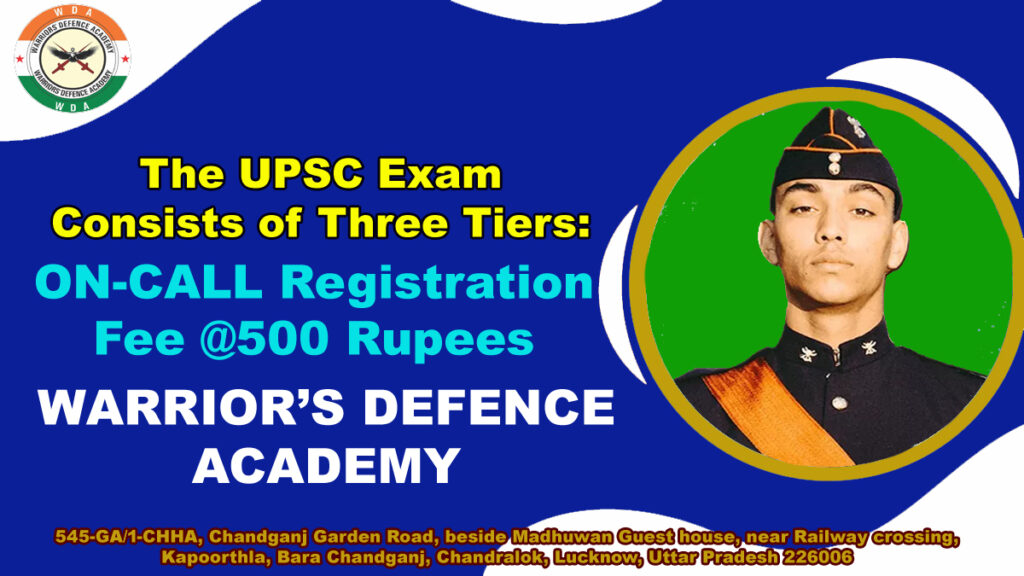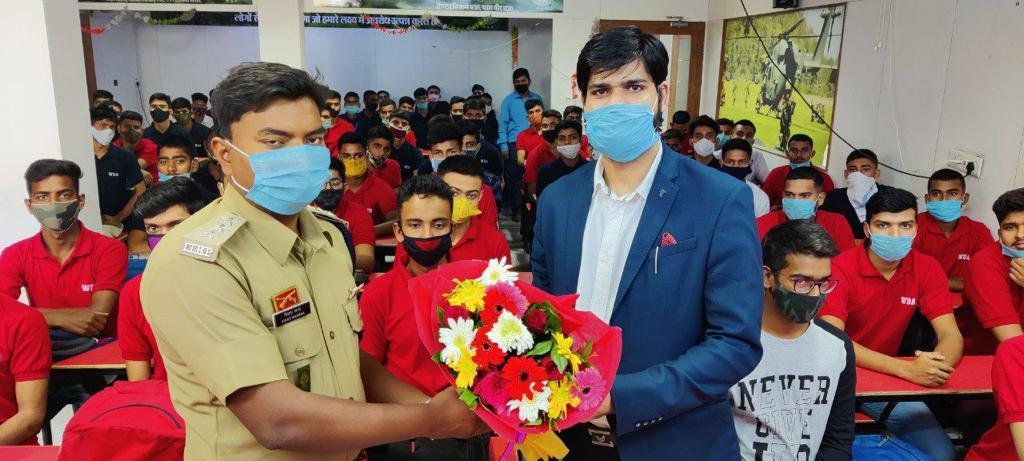The UPSC exam consists of three tiers:
UPSC exam consists of three tiers: We offer excellent preparatory training for the entrance examinations to get into the Indian armed forces.

Since our inception 7 years ago, under the captaincy of one of India’s leading youngest entrepreneurs – Mr. Gulab Singh. Hundreds of our candidates have been selected and many of whom have attained top ranks in final UPSC merit. “The UPSC exam consists of three tiers:”
- The institute has highly qualified and reputed team instructors each fully devoted to providing an unparalleled education for NDA/CDS/SSB/AFCAT/CAPF.
- The task of teaching transcends the classrooms so as to guide the students to realize their highest potential, and to encourage them to optimize the results.
- Involvement and excellence in extracurricular activities like SSB guidance, personality development, debates, team games, lecture, etc feature in the training.
- Our aim at the academy is to make the students imbibe discipline and groom moral and ethical values. Come, be a part of this success story and fulfill your desire for joining the reputed Indian Armed forces and serving the nation. “The UPSC exam consists of three tiers:”
Best NDA Academy in Lucknow | Join WDA Lucknow – Warriors Defence Academy deeply appreciative and offer you our most grateful welcome. We are happy to announce that Ex. GTO Officer Colonel R. K. Tiwari Sir going to Join our Academy to Guide NDA and CDS aspirants For SSB. WDA is the Best NDA and SSB Coaching in Lucknow India. “The UPSC exam consists of three tiers:”
Warriors Defence Academy is the Best NDA Coaching in Lucknow. We are the Leading Coaching Institute for NDA/CDS/AFCAT/Army/Air Force/Navy Located in Lucknow. Warriors Defence Academy has the Largest GTO Ground in India. The Aspirants of Defence Services are guided by Ex. Defence Officers. WDA was also Awarded as Best NDA Academy in Lucknow. “The UPSC exam consists of three tiers:”
Address: 545-GA/1-CHHA, Chandganj Garden Road, beside Madhuwan Guest house, near Railway crossing, Kapoorthla, Bara Chandganj, Chandralok, Lucknow, Uttar Pradesh 226006
Website: https://warriorsdefenceacademy.com/
Website: https://www.warriorsndaacademy.com/
Call Now: 07081011964
Exam pattern and syllabus for UPSC Geoscientist and Geologist exam:
Stage I: Preliminary Examination
Stage II: Main Examination
Stage III: Personality Test
Geologist:
| Sl.no | Paper | Subject | Marks | Time Period |
| 1 | I | General English | 100 | 3 Hrs |
| 2 | II | Geology I | 200 | 3 Hrs |
| 3 | III | Geology II | 200 | 3 Hrs |
| 4 | IV | Geology III | 200 | 3 Hrs |
Combined Geologist and Geophysicist:
| Sl.no | Paper | Subject | Marks | Time Period |
| 1 | I | General English | 100 | 3 Hrs |
| 2 | II | Geophysics I | 200 | 3 Hrs |
| 3 | III | Geophysics II | 200 | 3 Hrs |
| 4 | IV | Geophysics III | 200 | 3 Hrs |
Chemist:
| Sl.no | Paper | Subject | Marks | Time Period |
| 1 | I | General English | 100 | 3 Hrs |
| 2 | II | Chemistry I | 200 | 3 Hrs |
| 3 | III | Chemistry II | 200 | 3 Hrs |
| 4 | IV | Chemistry III | 200 | 3 Hrs |
Jr Hydrogeologist:
| Sl.no | Paper | Subject | Marks | Time Period |
| 1 | I | General English | 100 | 3 Hrs |
| 2 | II | Geology I | 200 | 3 Hrs |
| 3 | III | Geology II | 200 | 3 Hrs |
| 4 | IV | Hydrogeology III | 200 | 3 Hrs |
- All the questions in the paper are conventional, that is each answer requires essay style write-up.
- The written exam comprises 4 papers for every post and English is standard for each.
- Each subject paper contains 200 marks.
- The exam duration is of 3 hours each.

Syllabus:
General English
- Short essays
- Conclusion
- Tenses
- Error correction
- Articles
- Vocabulary
- Synonyms and Antonyms
- Unseen passages
- Comprehension
- Sentence rearrangement
- Verb
- Fill in the blanks
- Idioms and phrases
- Adverb
- Theme Detection
- Word Formation
- Subject-Verb Agreement
- Grammar
- Sentence completion
- Passage completion
Geology I
- Geomorphology and remote sensing
- Electromagnetic radiation
- Applied Geomorphology
- Proterozoic stratigraphy
- Zones: Brittle and Ductile shear zones
- Gravity anomalies at mid-ocean ridges
- Concepts of Magnetostratigraphy
- Stratigraphy
- Geodynamics
- Paleontology
- Structural Geology
Geology II
- Mineralogy and Geochemistry & Isotope Geology.
- Principles of optical mineralogy.
- The external chemistry of crystals.
- Introduction to mineralogy.
- Accessory minerals.
- Geochronology and age of the earth.
- Igneous Petrology.
- Origin of magmas.
- Magmatic evolution and differentiation.
- Magmatism and tectonics.
- Intermediate rocks.
- Petrogenetic provinces.
- Metamorphic petrology & processes.
- Concepts and Theory.
- Effects of Metamorphism.
- Metamorphism in space and time.
- Environmental Geology and Natural hazards.
- Air sampling techniques.
- Fundamental concepts of Environmental Geology.
Geology III
- Indian mineral deposits and mineral economics.
- Ore genesis and Geophysics.
- Mineral exploration.
- Geology of fuels.
- Engineering Geology.
- Coastal techniques.
- Mineralogy and geochemistry of radioactive minerals.
- Maceral analysis of coal.
- Characters of source and reservoir rocks.
- Principles of mineral and prospecting and exploration.
- Ore deposits and ore minerals.
- Occurrence and distribution in India of metalliferous deposits.
Geophysics I
- Solid earth geophysics.
- Earthquake and Engineering Seismology.
- Mathematical methods in Geophysics.
- Geophysical inversion.
- Global optimization techniques.
- Fundamental concepts of inverse physics.
- Mathematical methods of physics.
- Thermodynamics and Statistical Physics.
- Introductory atmospheric and space physics.
Geophysics II
- Geophysical potential fields (Gravity and Magnetic).
- Electrical and Electromagnetic methods.
- Seismic prospecting.
- Borehole Geophysics (principals of good logging).
- Atomic and Molecular Physics and Properties and Characterization of materials.
- Nuclear and Particle Physics.
- Electromagnetic theory.
- Classical Mechanics.
- Electrostatics, Magnetostatics.
- The crystalline and amorphous structure of matter.
- Airborne EM systems.
- Principles of Gravity and Magnetic instruments.
Geophysics III
- Radiometric exploration / airborne geophysical surveys for Geological mapping.
- Digital electronics, radar systems, Satellite communications.
- Digital circuits. Number systems and codes.
- Crystalline and Amorphous structure of matter.
- Geophysical signal processing.
- Remote sensing and GIS Applications.
- Laser Cavity modes.
- Semiconductor devices.
- Laser systems.
- Marine Geophysics.
- Solid state physics.
- Electronics and devices.
- Quantum mechanics.
Chemistry I
- Chemical periodicity.
- Acid-Base reactions.
- Organometallic compounds.
- Nuclear Chemistry.
- p-Block Elements.
- Chemical bonding and structure.
- Chemistry and coordination compounds.
- Precipitation and Redox reactions.
- s-Block Elements.
- Chemistry of d- and f- block elements.
Chemistry II
- Kinetic theory and gaseous states.
- Collision of gas and molecules, real gases.
- Thermodynamics and equilibrium.
- Solution of non-electrolytes.
- Adsorption and surface chemistry.
- UV Spectra.
- Application of Second Law of Thermodynamics.
- Basic Principal and application of spectroscopy.
- Chemical kinetics and catalysis.
- Liquid state.
- Acids- bases and solvents.
- Thermodynamics
- Quantum chemistry.
- PMR Spectra.
Chemistry III
- Analytical chemistry.
- The theoretical basis of quantitative inorganic analysis.
- Gravimetric analysis.
- Sampling and treating of samples for chemical analysis.
- Volumetric analysis.
- Acid-base titration.
- Redox Titration.
- Complexometric titration.
- Chromatographic methods of analysis.
- X-ray methods of analysis.
- Analysis of minerals. Ores and Alloys.
- Basic organic chemistry.
- Bonding and physical chemistry.
- Mechanism of some name reactions.
- Flame photometry and Atomic absorption spectrometry.
- Inductively coupled plasma spectroscopy.
- Analysis of petroleum and petroleum products.
- UV-visible spectroscopy.
- Electrocyclic reactions.
- Organic reaction mechanisms.
- Organometallic compounds.
- Aldol and related reactions.
- Organic spectroscopy.
Hydrogeology
- Origin, occurrence, and distribution of water.
- Groundwater Hydraulics.
- Groundwater exploration and water well construction.
- Geologic and hydrogeologic methods of exploration.
- Groundwater quality.
- Physical and chemical properties of water.
- Groundwater management.













